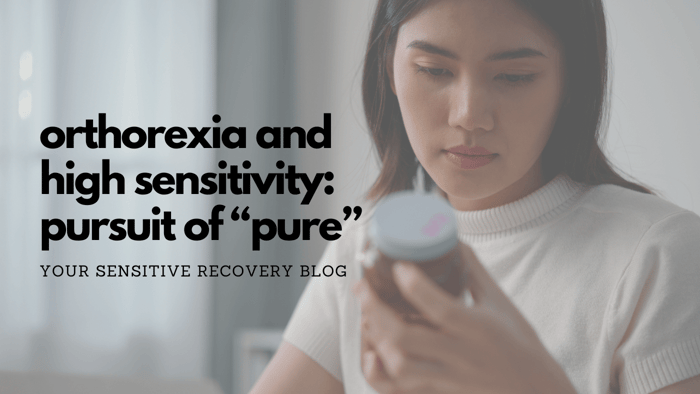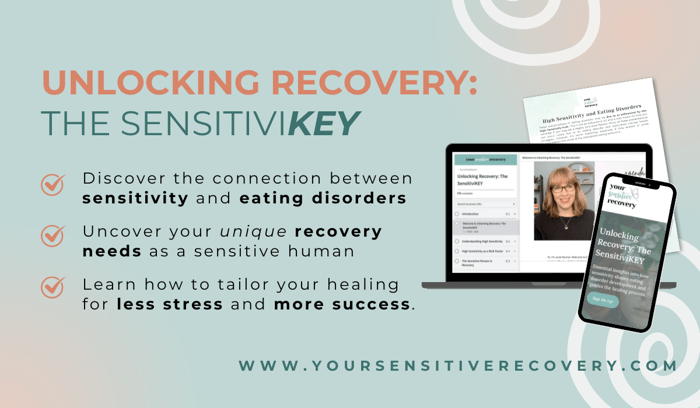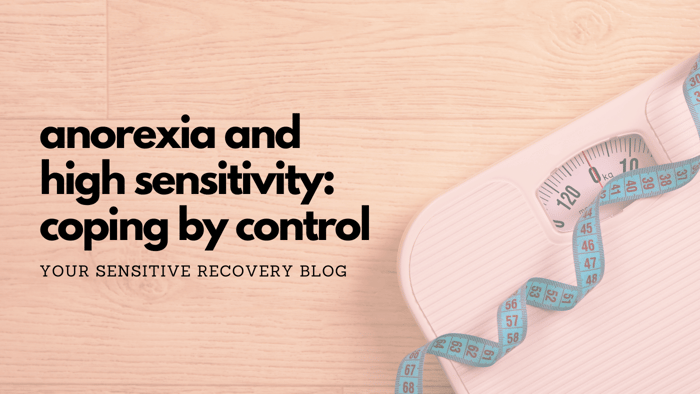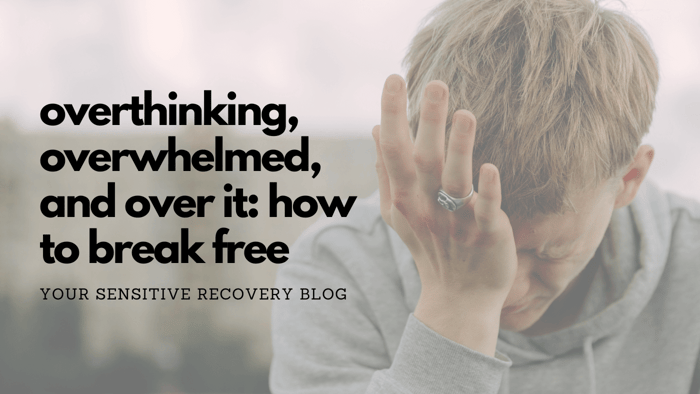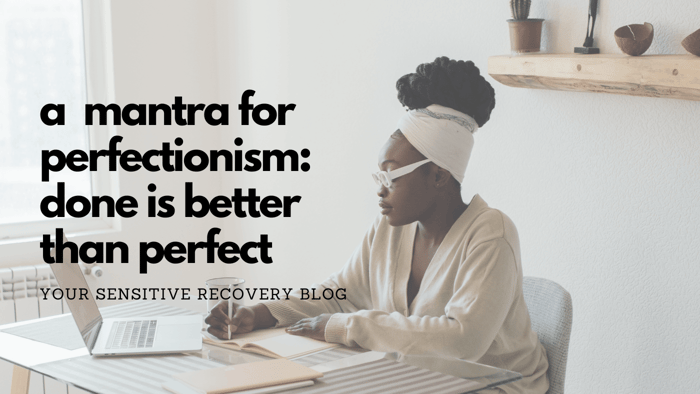Welcome back to my final post in this blog series exploring how High Sensitivity can influence the development and maintenance of disordered eating. This post concerns an all too common food-focused struggle that flies under the radar in our health-obsessed, diet-centric culture...so much so that it isn't even a diagnosis. But it's real, and so are the consequences. I'm talking about Orthorexia.
Orthorexia presents as an obsessive preoccupation with "healthy" eating that is not necessarily driven by the pursuit of thinness, but more so by the perception of optimal health. Anyone can be at risk for developing this eating disorder, yet Highly Sensitive People, with our depth of processing, may be uniquely vulnerable. But full recovery is real, and with the right tools and support, it can be your reality.
If you or someone you know is struggling with or at risk of developing orthorexia, please read on.
👉 NOTE: While this post focuses on orthorexia, the information in this post may also apply to folks with Other Specified Feeding and Eating Disorders (OSFED), or non-diagnosed disordered eating where there's an extreme focus on the health or "cleanliness" of foods.
Am I a Highly Sensitive Person?
So what exactly is High Sensitivity? Well, I'm glad you asked. High Sensitivity is not a diagnosis or a disorder, It's a natural trait found in 15-30% of the population and its scientific name is Sensory Processing Sensitivity. HSPs process information deeply, notice subtleties others may overlook, and often experience emotions and sensory information more intensely. It's a totally natural variation on the spectrum of sensitivity.
Highly Sensitive People have usually heard that they're "too sensitive" so many times throughout their lives that it has become internalized as truth. But let me be clear, you are not too sensitive. You're wired this way, and your sensitivity is not a flaw.
"It was so validating to finally put words to my experience. I've felt different my whole life...more vulnerable and more intense. Now that I know I'm an HSP, I can take care of myself so much better." - Carol (61 yrs)*For some Highly Sensitive People, the drive to find safety and calm in an overstimulating world can transfer into their relationship with food.
This is where orthorexia can take root. Understanding the basics of this eating disorder can help you recognize if your pursuit of health has crossed into harmful territory.
The Basics of Orthorexia
What separates orthorexia from other eating disorders, like anorexia, is that orthorexia is not necessarily driven by body image or the desire for weight loss, although that can play a role. What primarily drives orthorexia, however, is the relentless pursuit of a diet or dietary habits that are perceived as most beneficial for one's physical health.
Coined in the late 1990s, the term orthorexia translates to "correct appetite" and can very much look like a diet or "food lifestyle" gone awry. People who struggle with this eating disorder feel compelled to only eat "clean" or "pure" foods or will hyper-fixate on finding the "perfect" eating habits for optimal health. (This is a trend commonly referred to as bio-hacking, by the way.)
The problem is that food is not a moral issue and what is deemed healthy or unhealthy is extremely subjective.
Due to restricting or eliminating certain types of food, malnutrition is common but sometimes the mental side effects can be even more damaging. In addition to strict food rules, people with orthorexia often experience intense anxiety when facing decisions related to eating. They may spend hours researching foods and diets, scrutinizing nutrition labels, and may become fearful of social situations where they don't know or can't control the food being served.
"I just want to be the best that I can be for my sport, but there's so much conflicting information about the 'right' way to eat. I've been eliminating more and more things from my diet. Now hardly anything seems good enough." - Kyle (20 yrs)*What starts as an attempt to be healthy can quickly become all-consuming, leading to guilt, shame, and distress when the self-imposed rules are broken.
When I talk about obsessions as a part of orthorexia, I don't use that term lightly. Orthorexia shares many similarities with Obsessive-Compulsive Disorder (OCD), particularly in the way that it involves rigid thinking, compulsive behaviors, and an overwhelming need for certainty. The fear of making an "unhealthy" choice can trigger intrusive thoughts, which are then temporarily relieved by compulsive behaviors (excessive meal planning, macro tracking, etc.). And just like in OCD, the cycle reinforces itself, which makes it increasingly difficult to eat intuitively or flexibly.
How High Sensitivity Can Fuel the Orthorexic Obsessions
For Highly Sensitive People, it's primarily our depth of processing that may increase our risk of crossing over from "health-conscious" to "health-obsessed." HSPs often struggle to make decisions when there are too many options and therefore may be more susceptible to the influence of diet trends or "lifestyles" like veganism, gluten-free eating, or intermittent fasting.
For an HSP already struggling with food sensitivities, sensory struggles, or health anxiety, eliminating food groups or habits (like eating after 7pm, for example) can reinforce avoidance behaviors and make it even harder to meet nutritional needs.
Being that Highly Sensitive folks are wired to take in more information and mull everything over on a deeper level, there is a higher likelihood of us becoming overstimulated, and sometimes even paralyzed by overwhelm. HSPs are naturally often on the hunt (consciously or not) for ways to feel more balanced, clearheaded, and relaxed.
Nobody chooses to have an eating disorder, but the fixation with food in orthorexia does at first offer structure and control in a way that can be very appealing and even helpful for HSPs...until it's not.
Prioritizing an HSP-Friendly Recovery
Full recovery from orthorexia is absolutely possible, and for Highly Sensitive People, it’s essential to address not just the symptoms but also the underlying sensitivity that may have influenced disordered eating. While orthorexia can be a part of your past, your sensitivity is here to stay.
Key Areas to Focus on in Recovery:
- Continue Exploring High Sensitivity: The more you learn about your trait, the better. You'll gain a greater understanding of how to approach the challenges of living as an HSP and how to utilize its innate gifts as assets in your recovery.
- Embrace Rest: HSPs can often feel driven to "get things right" or "go-go-go" almost as a way to make up for the perceived "fault" of being sensitive. In recovery, learning to rest, physically, mentally, and emotionally, is vital. Give yourself permission to slow down.
- Grieve the Struggles: Acknowledge any pain associated with living as a sensitive person in an insensitive world. Grieving what orthorexia may have taken from you is also so important, and so powerful.
- Work in Exposures Gently: Orthorexia treatment often involves exposure therapy, which can be extremely helpful but sometimes overwhelming for HSPs. Make sure you go at your own pace and build up to harder and harder challenges.
- Focus on Other Aspects of Your Identity: Many people with orthorexia see their health and their food choices as integral parts of their identity. Consciously pay attention to and nurture the other values, passions, and relationships that make up your sense of self.
- Practice Self-Compassion: Counter your perfectionistic and self-critical tendencies with the same kindness you would show your favorite people. Consider how you would interact with a young child who was exploring eating food for the first time. You'd probably be pretty gentle and encouraging, right?
- Find Your People: Connect with other Highly Sensitive People as well as other folks who are healing from or have recovered from disordered eating. Validation and support are essential ingredients in a full recovery.
Your Sensitivity is Beautiful
It didn't cause orthorexia. But as I see all the time in my work with clients, we can take our natural traits to the dark or the light (ex: impulsive becomes spontaneous). So if you see yourself in this connection between High Sensitivity and orthorexia, know that you can take your sensitive characteristics to the light.
By embracing your High Sensitivity as a source of strength, and working to prioritize HSP-friendly recovery tools you can be free from obsessive food thoughts and the behaviors that are keeping your life small and rigid.
You are not too sensitive. And you CAN heal. 🙌
* Names and other identifying details have been changed to protect privacy.
✨ Josie Munroe, LMFT is a licensed therapist and owner of JosieMunroe.com and Your Sensitive Recovery. As a recovered clinician and Highly Sensitive Person, she loves supporting others on their journeys to form new, empowered relationships with food, their bodies, and their sensitivity. Join the newsletter for a weekly boost of hope and inspiration. You deserve a recovery that works for you! ✨

